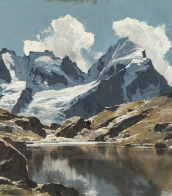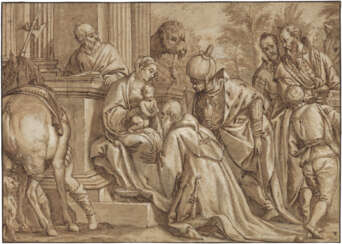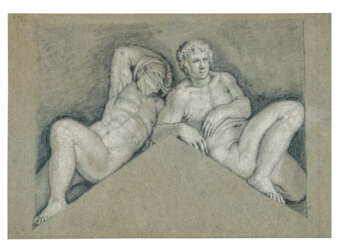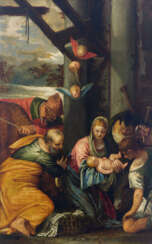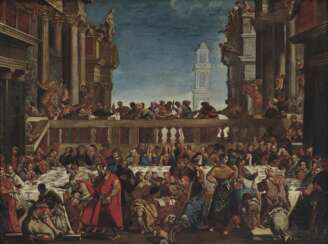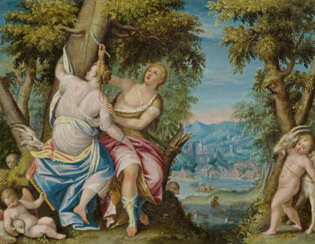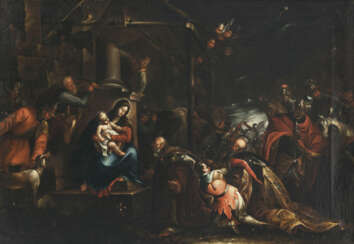паоло веронезе (1528 - 1588)
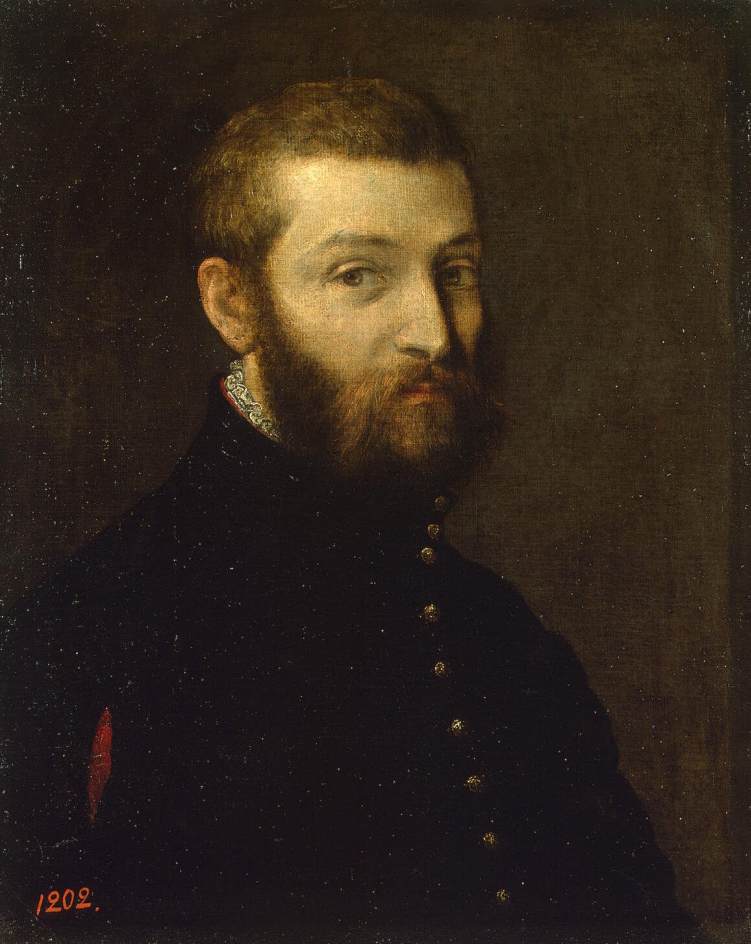
Paolo Veronese, born Paolo Caliari, was a distinguished painter of the 16th-century Venetian school. Renowned for his vibrant use of color and majestic compositions, Veronese's artworks often depicted allegorical, biblical, or historical subjects set within grandiose settings of Renaissance architecture. His mastery in color and illusionary compositions that expand beyond the canvas' confines made him a pivotal figure in the Venetian Renaissance.
His early years were marked by an apprenticeship with Antonio Badile, leading to a significant influence from Mannerist artists and a development of his unique style, characterized by radiant palettes and elegant figures. Paolo Veronese's works, including major altarpieces and large-scale feast scenes, were celebrated for their elaborate detail and classical harmony, reflecting influences from artists like Titian, Raphael, and Parmigianino.
One of Paolo Veronese's specialties was grand scenes of feasts, such as "The Wedding at Cana" and "The Feast in the House of Levi," which showcased his ability to blend narrative with ornate details, often sparking controversy and admiration alike. His significant contributions to the art world, from the full-scale decoration of the Venetian church of S. Sebastiano to the splendid ceiling and wall paintings for the library of S. Marco, left an indelible mark on the Renaissance art scene.
For collectors and experts in art and antiques, Paolo Veronese's works represent a blend of classical beauty, innovative use of color, and narrative depth, making his paintings a significant focus for art historical study and appreciation.
To stay informed about exhibitions and auction events featuring Paolo Veronese's works, art enthusiasts are encouraged to subscribe to updates from reputable art institutions.
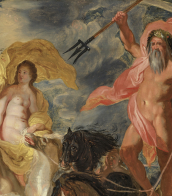

Paolo Veronese, born Paolo Caliari, was a distinguished painter of the 16th-century Venetian school. Renowned for his vibrant use of color and majestic compositions, Veronese's artworks often depicted allegorical, biblical, or historical subjects set within grandiose settings of Renaissance architecture. His mastery in color and illusionary compositions that expand beyond the canvas' confines made him a pivotal figure in the Venetian Renaissance.
His early years were marked by an apprenticeship with Antonio Badile, leading to a significant influence from Mannerist artists and a development of his unique style, characterized by radiant palettes and elegant figures. Paolo Veronese's works, including major altarpieces and large-scale feast scenes, were celebrated for their elaborate detail and classical harmony, reflecting influences from artists like Titian, Raphael, and Parmigianino.
One of Paolo Veronese's specialties was grand scenes of feasts, such as "The Wedding at Cana" and "The Feast in the House of Levi," which showcased his ability to blend narrative with ornate details, often sparking controversy and admiration alike. His significant contributions to the art world, from the full-scale decoration of the Venetian church of S. Sebastiano to the splendid ceiling and wall paintings for the library of S. Marco, left an indelible mark on the Renaissance art scene.
For collectors and experts in art and antiques, Paolo Veronese's works represent a blend of classical beauty, innovative use of color, and narrative depth, making his paintings a significant focus for art historical study and appreciation.
To stay informed about exhibitions and auction events featuring Paolo Veronese's works, art enthusiasts are encouraged to subscribe to updates from reputable art institutions.
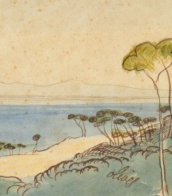

Paolo Veronese, born Paolo Caliari, was a distinguished painter of the 16th-century Venetian school. Renowned for his vibrant use of color and majestic compositions, Veronese's artworks often depicted allegorical, biblical, or historical subjects set within grandiose settings of Renaissance architecture. His mastery in color and illusionary compositions that expand beyond the canvas' confines made him a pivotal figure in the Venetian Renaissance.
His early years were marked by an apprenticeship with Antonio Badile, leading to a significant influence from Mannerist artists and a development of his unique style, characterized by radiant palettes and elegant figures. Paolo Veronese's works, including major altarpieces and large-scale feast scenes, were celebrated for their elaborate detail and classical harmony, reflecting influences from artists like Titian, Raphael, and Parmigianino.
One of Paolo Veronese's specialties was grand scenes of feasts, such as "The Wedding at Cana" and "The Feast in the House of Levi," which showcased his ability to blend narrative with ornate details, often sparking controversy and admiration alike. His significant contributions to the art world, from the full-scale decoration of the Venetian church of S. Sebastiano to the splendid ceiling and wall paintings for the library of S. Marco, left an indelible mark on the Renaissance art scene.
For collectors and experts in art and antiques, Paolo Veronese's works represent a blend of classical beauty, innovative use of color, and narrative depth, making his paintings a significant focus for art historical study and appreciation.
To stay informed about exhibitions and auction events featuring Paolo Veronese's works, art enthusiasts are encouraged to subscribe to updates from reputable art institutions.
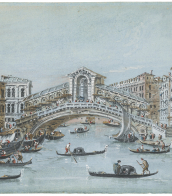

Paolo Veronese, born Paolo Caliari, was a distinguished painter of the 16th-century Venetian school. Renowned for his vibrant use of color and majestic compositions, Veronese's artworks often depicted allegorical, biblical, or historical subjects set within grandiose settings of Renaissance architecture. His mastery in color and illusionary compositions that expand beyond the canvas' confines made him a pivotal figure in the Venetian Renaissance.
His early years were marked by an apprenticeship with Antonio Badile, leading to a significant influence from Mannerist artists and a development of his unique style, characterized by radiant palettes and elegant figures. Paolo Veronese's works, including major altarpieces and large-scale feast scenes, were celebrated for their elaborate detail and classical harmony, reflecting influences from artists like Titian, Raphael, and Parmigianino.
One of Paolo Veronese's specialties was grand scenes of feasts, such as "The Wedding at Cana" and "The Feast in the House of Levi," which showcased his ability to blend narrative with ornate details, often sparking controversy and admiration alike. His significant contributions to the art world, from the full-scale decoration of the Venetian church of S. Sebastiano to the splendid ceiling and wall paintings for the library of S. Marco, left an indelible mark on the Renaissance art scene.
For collectors and experts in art and antiques, Paolo Veronese's works represent a blend of classical beauty, innovative use of color, and narrative depth, making his paintings a significant focus for art historical study and appreciation.
To stay informed about exhibitions and auction events featuring Paolo Veronese's works, art enthusiasts are encouraged to subscribe to updates from reputable art institutions.
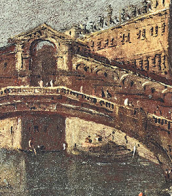

Paolo Veronese, born Paolo Caliari, was a distinguished painter of the 16th-century Venetian school. Renowned for his vibrant use of color and majestic compositions, Veronese's artworks often depicted allegorical, biblical, or historical subjects set within grandiose settings of Renaissance architecture. His mastery in color and illusionary compositions that expand beyond the canvas' confines made him a pivotal figure in the Venetian Renaissance.
His early years were marked by an apprenticeship with Antonio Badile, leading to a significant influence from Mannerist artists and a development of his unique style, characterized by radiant palettes and elegant figures. Paolo Veronese's works, including major altarpieces and large-scale feast scenes, were celebrated for their elaborate detail and classical harmony, reflecting influences from artists like Titian, Raphael, and Parmigianino.
One of Paolo Veronese's specialties was grand scenes of feasts, such as "The Wedding at Cana" and "The Feast in the House of Levi," which showcased his ability to blend narrative with ornate details, often sparking controversy and admiration alike. His significant contributions to the art world, from the full-scale decoration of the Venetian church of S. Sebastiano to the splendid ceiling and wall paintings for the library of S. Marco, left an indelible mark on the Renaissance art scene.
For collectors and experts in art and antiques, Paolo Veronese's works represent a blend of classical beauty, innovative use of color, and narrative depth, making his paintings a significant focus for art historical study and appreciation.
To stay informed about exhibitions and auction events featuring Paolo Veronese's works, art enthusiasts are encouraged to subscribe to updates from reputable art institutions.
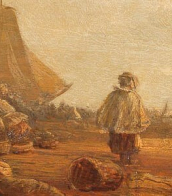

Paolo Veronese, born Paolo Caliari, was a distinguished painter of the 16th-century Venetian school. Renowned for his vibrant use of color and majestic compositions, Veronese's artworks often depicted allegorical, biblical, or historical subjects set within grandiose settings of Renaissance architecture. His mastery in color and illusionary compositions that expand beyond the canvas' confines made him a pivotal figure in the Venetian Renaissance.
His early years were marked by an apprenticeship with Antonio Badile, leading to a significant influence from Mannerist artists and a development of his unique style, characterized by radiant palettes and elegant figures. Paolo Veronese's works, including major altarpieces and large-scale feast scenes, were celebrated for their elaborate detail and classical harmony, reflecting influences from artists like Titian, Raphael, and Parmigianino.
One of Paolo Veronese's specialties was grand scenes of feasts, such as "The Wedding at Cana" and "The Feast in the House of Levi," which showcased his ability to blend narrative with ornate details, often sparking controversy and admiration alike. His significant contributions to the art world, from the full-scale decoration of the Venetian church of S. Sebastiano to the splendid ceiling and wall paintings for the library of S. Marco, left an indelible mark on the Renaissance art scene.
For collectors and experts in art and antiques, Paolo Veronese's works represent a blend of classical beauty, innovative use of color, and narrative depth, making his paintings a significant focus for art historical study and appreciation.
To stay informed about exhibitions and auction events featuring Paolo Veronese's works, art enthusiasts are encouraged to subscribe to updates from reputable art institutions.
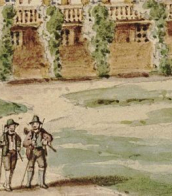

Paolo Veronese, born Paolo Caliari, was a distinguished painter of the 16th-century Venetian school. Renowned for his vibrant use of color and majestic compositions, Veronese's artworks often depicted allegorical, biblical, or historical subjects set within grandiose settings of Renaissance architecture. His mastery in color and illusionary compositions that expand beyond the canvas' confines made him a pivotal figure in the Venetian Renaissance.
His early years were marked by an apprenticeship with Antonio Badile, leading to a significant influence from Mannerist artists and a development of his unique style, characterized by radiant palettes and elegant figures. Paolo Veronese's works, including major altarpieces and large-scale feast scenes, were celebrated for their elaborate detail and classical harmony, reflecting influences from artists like Titian, Raphael, and Parmigianino.
One of Paolo Veronese's specialties was grand scenes of feasts, such as "The Wedding at Cana" and "The Feast in the House of Levi," which showcased his ability to blend narrative with ornate details, often sparking controversy and admiration alike. His significant contributions to the art world, from the full-scale decoration of the Venetian church of S. Sebastiano to the splendid ceiling and wall paintings for the library of S. Marco, left an indelible mark on the Renaissance art scene.
For collectors and experts in art and antiques, Paolo Veronese's works represent a blend of classical beauty, innovative use of color, and narrative depth, making his paintings a significant focus for art historical study and appreciation.
To stay informed about exhibitions and auction events featuring Paolo Veronese's works, art enthusiasts are encouraged to subscribe to updates from reputable art institutions.
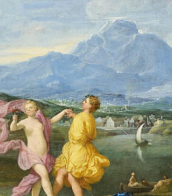

Paolo Veronese, born Paolo Caliari, was a distinguished painter of the 16th-century Venetian school. Renowned for his vibrant use of color and majestic compositions, Veronese's artworks often depicted allegorical, biblical, or historical subjects set within grandiose settings of Renaissance architecture. His mastery in color and illusionary compositions that expand beyond the canvas' confines made him a pivotal figure in the Venetian Renaissance.
His early years were marked by an apprenticeship with Antonio Badile, leading to a significant influence from Mannerist artists and a development of his unique style, characterized by radiant palettes and elegant figures. Paolo Veronese's works, including major altarpieces and large-scale feast scenes, were celebrated for their elaborate detail and classical harmony, reflecting influences from artists like Titian, Raphael, and Parmigianino.
One of Paolo Veronese's specialties was grand scenes of feasts, such as "The Wedding at Cana" and "The Feast in the House of Levi," which showcased his ability to blend narrative with ornate details, often sparking controversy and admiration alike. His significant contributions to the art world, from the full-scale decoration of the Venetian church of S. Sebastiano to the splendid ceiling and wall paintings for the library of S. Marco, left an indelible mark on the Renaissance art scene.
For collectors and experts in art and antiques, Paolo Veronese's works represent a blend of classical beauty, innovative use of color, and narrative depth, making his paintings a significant focus for art historical study and appreciation.
To stay informed about exhibitions and auction events featuring Paolo Veronese's works, art enthusiasts are encouraged to subscribe to updates from reputable art institutions.
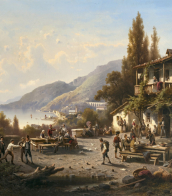

Paolo Veronese, born Paolo Caliari, was a distinguished painter of the 16th-century Venetian school. Renowned for his vibrant use of color and majestic compositions, Veronese's artworks often depicted allegorical, biblical, or historical subjects set within grandiose settings of Renaissance architecture. His mastery in color and illusionary compositions that expand beyond the canvas' confines made him a pivotal figure in the Venetian Renaissance.
His early years were marked by an apprenticeship with Antonio Badile, leading to a significant influence from Mannerist artists and a development of his unique style, characterized by radiant palettes and elegant figures. Paolo Veronese's works, including major altarpieces and large-scale feast scenes, were celebrated for their elaborate detail and classical harmony, reflecting influences from artists like Titian, Raphael, and Parmigianino.
One of Paolo Veronese's specialties was grand scenes of feasts, such as "The Wedding at Cana" and "The Feast in the House of Levi," which showcased his ability to blend narrative with ornate details, often sparking controversy and admiration alike. His significant contributions to the art world, from the full-scale decoration of the Venetian church of S. Sebastiano to the splendid ceiling and wall paintings for the library of S. Marco, left an indelible mark on the Renaissance art scene.
For collectors and experts in art and antiques, Paolo Veronese's works represent a blend of classical beauty, innovative use of color, and narrative depth, making his paintings a significant focus for art historical study and appreciation.
To stay informed about exhibitions and auction events featuring Paolo Veronese's works, art enthusiasts are encouraged to subscribe to updates from reputable art institutions.
